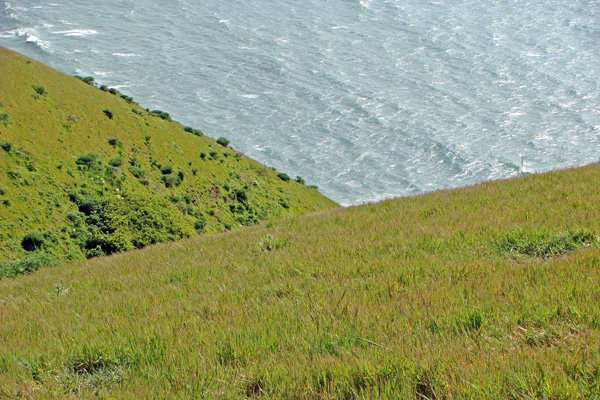
After I gave my talk at Sonoma State this week, I walked the Tomales Point trail at the Point Reyes National Seashore.
There are a number of active dairy ranches on Point Reyes; the park service maintains the buildings of an abandoned farm compound called the Pierce Point Ranch, and that’s where the Tomales Point trail starts.
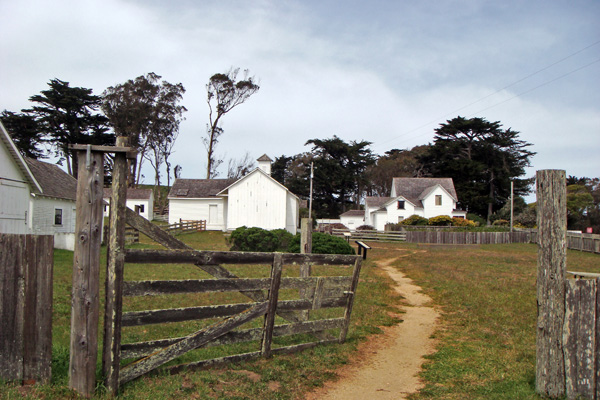
The path is an easy, but exceedingly windy, walk — you go out and back along the northernmost spit of Point Reyes. The sandy ground was covered with yellow/orange poppies and clumps of purple irises. Rather than pushing straight to the very tip, I veered off the path and took my time.
I saw the local “tule elk” herd on the Tomales Bay side. And on the way back I walked on the edges of the bluffs on the Pacific Ocean side.
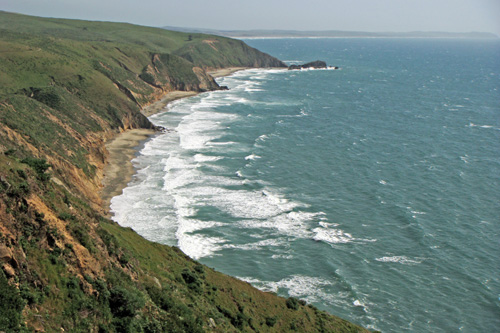
I love these sky/sea/cliff views; I can briefly forget myself and merge into the landscape. When I wasn’t merged, I was fretting about POD publishing of all things, thinking about Amazon’s recent greedhead move. When I’m between books, I don’t have the usual kinds of things to think about. I get a little squirrely when I don’t have an invented world that I’m partly living in, a shell that I’m growing around me all day every day.
At the end of day, even though I was exhausted, I made my way to McClure’s Beach, which is downhill from the Tomales Point trailhead.
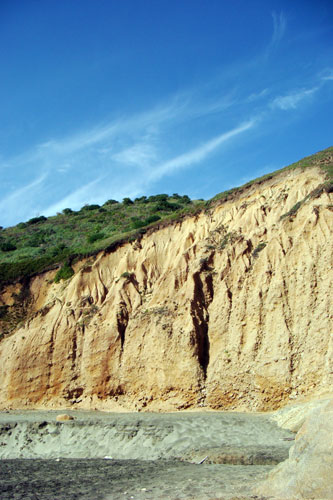
The talk at Sonoma went well. I don’t think we managed to tape it. For a change, I didn’t use PowerPoint, and rattled on more or less extemporaneously about the ideas underlying my SF philosophy paper, “Everything Is Alive.” The students and teachers seemed to like it, and asked a lot of questions. Over the years, I’ve developed the skill of parrying difficult philosophical questions — if you’re a philosopher you don’t exactly have to refute a counterclaim, you only have to show that your own way of thinking is interesting enough to investigate.
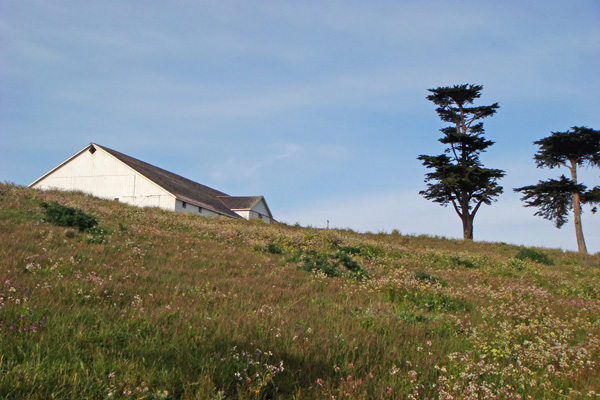
I felt a little letdown after the talk, though. Is it that I miss teaching? No, I think it’s that I no longer feel like teaching or lecturing at all. I think I’m tired of explaining my ideas; that’s the nice thing about being a writer — you get it down in black and white for once and for all. When I speak, I often encounter blank incomprehension, which is a little unsettling to see. Like I’m from Mars.
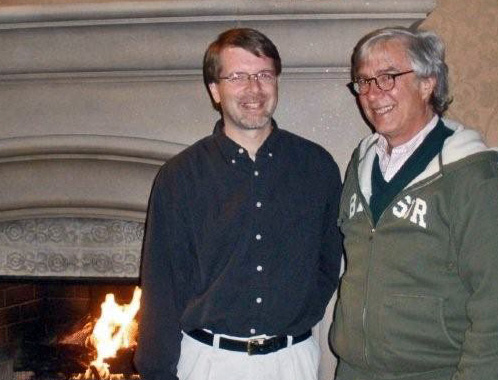
[Photo by David Povilaitis]
But I will say that at Sonoma State, quite a few in the audience were in fact on my wavelength, especially my host John Sullins, a former student who’s now the chair of the Phil Dept, and my old pal David Povilaitis, who illustrated my book The Fourth Dimension. I learn a lot from the question-and-answer sessions, if nothing else, it’s good exercise, not unlike fencing — which Sullins happens to teach as well!
But at this point in my life, I no longer care very much if I can convince anyone or not. It’s like, at this point, my increasingly far-fetched ideas are art objects I’ve crafted, and it’s pointless to ask if they’re true. I’m fond of them, and I draw some comfort from them, and I like dramatizing them in SF novels — but I don’t want to put emotional energy into the task (which by now I know to be fruitless) of converting people.
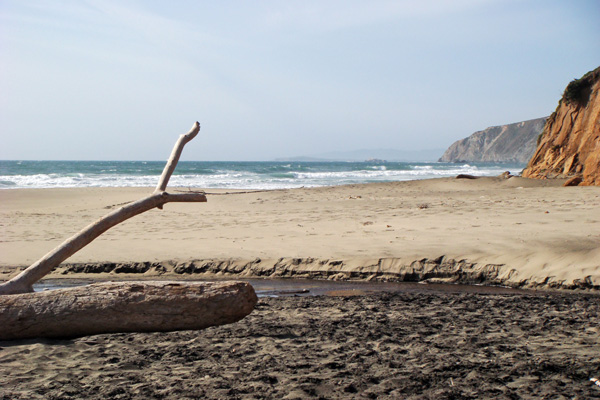
As I mentioned my novel Postsingular at the talk, the subject of the singularity-maven Ray Kurzweil came up. There was an article in Wired last month which discussed about Ray’s obsession with living a long time. Ray actually sells pills online! Might the phrase “snake-oil salesman” have any relevance here?
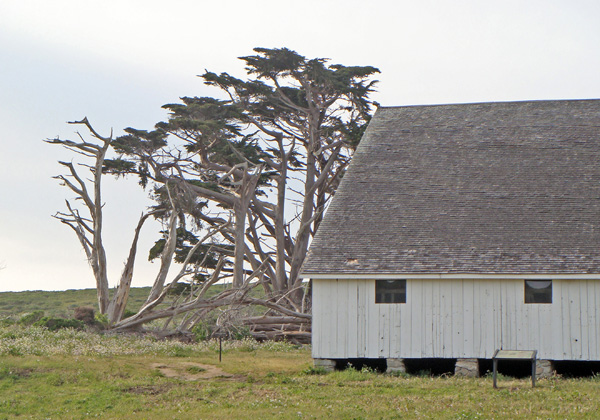
The problem of death is like a koan: “Hi, you’re alive and everything is great. But you’re going to die and it’s all going to end. What are you going to do about that?”
I’ve been thinking about philosophy and the problem of death ever since I was sixteen — what set me off at that time was that I was in a potentially lethal car crash. After nearly fifty years of grappling with the problem of death, I’ve reached the point where I’m okay with it — that is, it doesn’t totally freak me out.
I enjoy life, mind you, and I go to reasonable lengths to stay healthy and to keep myself alive. I don’t want to die. But I’d like to think that I’ve learned to face the prospect with a certain equanimity and philosophical detachment.
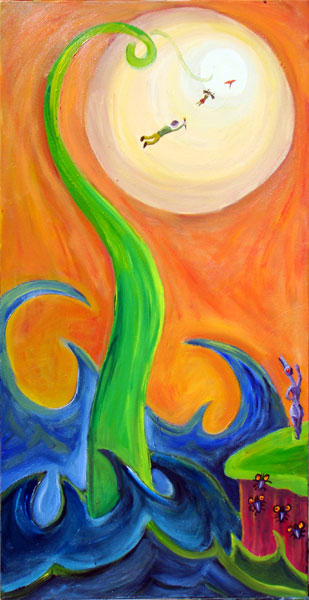
The key move is to identify my “self” with something larger than my doomed meat body. I might, for instance, think of my “self” as extending into my descendents, or into the minds of my students and readers.
Even more lastingly, I can identify my “self” with the Ultimate Being that underlies the Cosmos — whatever that is. The big “I Am.”
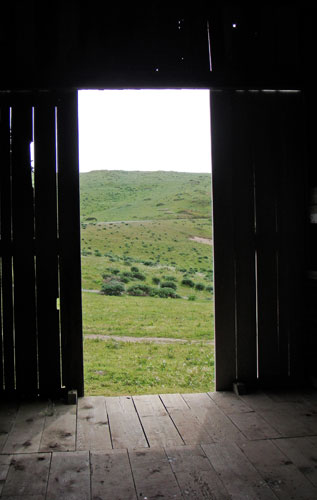
This classic rubric for this philosophical move is to describe death as follows: “The dewdrop slides into the shining sea.”
Letting go of an obsessive attachment to your meat body is a source of liberation. If you’re totally freaked about your mortality, it makes for a weak point where the government and big business can get at you. They use the fear to control you. The subtext of the majority of ads and government propaganda is: do what we say or you’ll die.
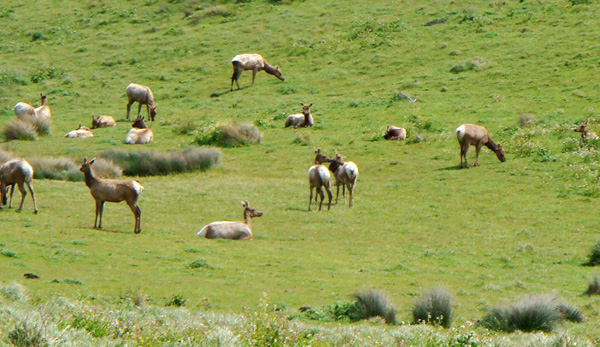
It’s good to be alive today. That’s all I get (today), and that’s enough.
Brave words, mouth noises, but they have no real bearing on the ache of nostalgia that I felt driving south along the coast in the dusk, as if driving through my life, past the south end of Point Reyes where my son had his 30th birthday party five years ago, past Stinson Beach where the family and I gathered after my mother’s death thirteen years ago, through Muir Beach where I worked on the CA Lab software with John Walker twenty years ago…is it life’s transitory nature that makes it so painful and so sweet?









April 10th, 2008 at 12:47 pm
Great post, Rudy. Thanks for sharing.
By the way, I really like the photos you include in your posts.
April 11th, 2008 at 3:51 pm
When contemplating my own mortality, your writing has helped me come to terms with the inevitable. I can’t remember which book it was but you said, that we need move out of the way, so future generations can have to space to live in, which makes sense. Also that each of us will always exist as a unique mathematical formula, never to be re-created. Something like a special coloring of Hilbert Space, was that the phrase you used?
Thanks for the help!
ps. Keep doing the talks and recording and posting them. I listen to them!
April 11th, 2008 at 5:15 pm
That is certainly a wonderful trail! Glad to see the elk looking so content. The last time I hiked it there was a dense fog, and just as I broke thorugh the fog, there they were. I could hear their strange calls well before I saw them. Not the way I would expect such large animals to sound.
April 14th, 2008 at 9:36 am
I tend to get a glimpse of what relative eternity really feells like when visiting beaches in Point Reyes and the Sonoma Coast – a walk down to the beach is a sure way to unclutter one’s mind from the electronic gaol smog we usually live caught up with.
April 15th, 2008 at 10:14 am
Have you ever seen the Steven Levine book A Year Live? I think you’d rather enjoy reading it at this point in your life cycle.
My own life experience tells me that a person cannot live life well until he/she can embrace the inevitability of death. It’s only when I am fully aware that my life must end that l participate in it fully and responsibly. When that happens I can feel profound fear and not be vulnerable to control by (or try to assert my control over) an outside agency. I’m not saying I can accomplish that all the time. I’m just saying that for me I’m really living when I’m dancing in the light with Death.
I’ve experienced this numerous times in my life cycle, when my health problems or the health problems of my immediate family members put everything that concerns me in stark perspective.
April 15th, 2008 at 10:46 am
I was also taken by your statement that you’ve surrendered teaching/lecturing because you’re fed up with the blank stares of folks who can’t seem to understand what you mean when you try to explain things to them.
I’ve heard this so often from the gifted people I know: there seems to be a membrane that separates even the most articulate of them from the rest of the people in their lives.
Those who can’t come to terms with that membrane become its victims (one young man I knew almost drank himself to death because of the loneliness he felt inside his “invisible skin”). The others can become the grateful receivers of its blessings.
It sounds to me as though you’ve learned to convert your experience of this membrane into your many artistic interests – literary writing (I understand you write poetry as well?) photography (at this point I’d put you on par with anyone in the galleries) and painting (at which you get better by the year).
Perhaps it’s really an interface between the known (yourself) and the unknown (others)… or if you see it from a Zen point of view, between the illusory and the directly experienced.
That’s what I feel when I look at your photos.
Like ideas peel away and what’s left is almost a first principle.
Something that calls neither for explanation or defense.
It stands as its own truth, one common to (the?) all.
It calls to mind something I read in The Memory Keeper’s Daughter. Photographs make what’s hidden in plain sight visible for those who may not have the courage to see the obvious.
The photo through the barn door made a nice compliment to your discussion about…. well about everything you discussed in this entry. Thanks, it was beautiful. Real. Bittersweet.
April 16th, 2008 at 12:45 am
Frankly, the point is this: nobody wants one with the Universe.
We want to me immortal materially. We want to be who we are. And better. Forever.
I’ve been trying to reach a notion, a new thought, a free idea, as beautiful as music or mathematics, about death.
There must be something above materialism and spiritualism.
I’ve written an essay about all that… yearning. Perhaps you might find something interesting.
It is here:
http://materialimmortality.blogspot.com/
I have learned a lot from you, Rudy. Thanks. Ever.
May 3rd, 2008 at 12:01 pm
I for one absolutely love hearing your thoughts on things, whether they be told in a straightforward way or by fiction.
As for mortality, I suppose I’m a bit Spinozaesque, but ultimately I find comfort in the idea that I’ll transform. I recently watched a special on Aspergers on NG and it featured a guy who could cite dates with ease, no matter what the time span was, past or future. He claims that he doesn’t compute the days but rather gets a feeling for them; that he understands them as the days line up with the years in his mind. I get a similar feeling about eternity and/or mortality, that it’s just another form of being in the universe and that I ‘line up’ with it in whatever state. If I were a theist, I’d liken it to being within the body of God and simultaneously being God itself. In any case, the universe suffices nicely as a linguistic reference…and if we’re talking about an expanding and collapsing cyclical universe, then that more intuitively adheres to my conception of eternity.